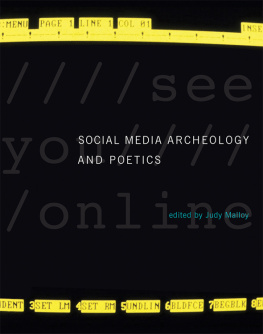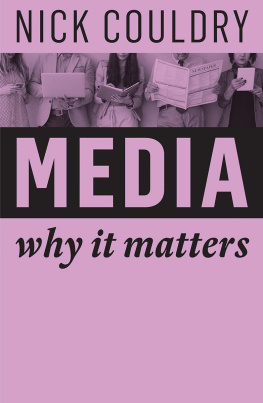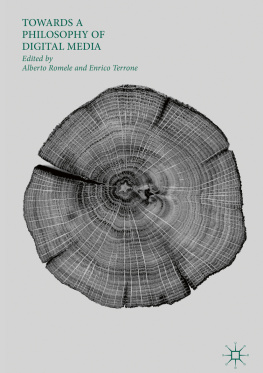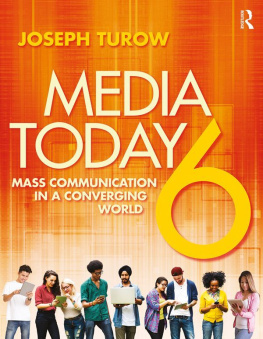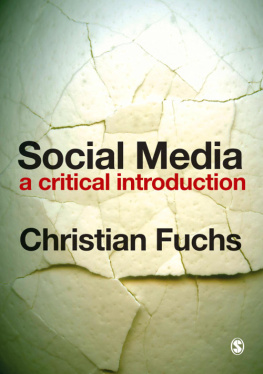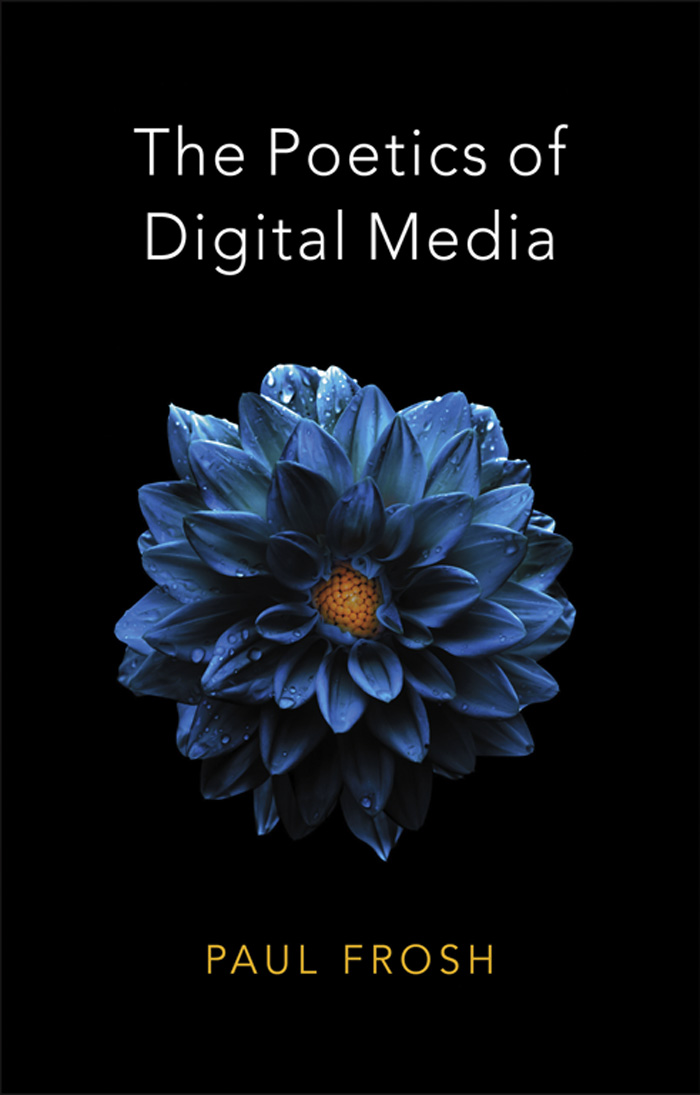Table of Contents
List of figures
Guide
Pages
For Caroline, Gefen, Tomer and Nitzan
The Poetics of Digital Media
Paul Frosh
polity
Copyright Paul Frosh 2019
The right of Paul Frosh to be identified as Author of this Work has been asserted in accordance with the UK Copyright, Designs and Patents Act 1988.
First published in 2019 by Polity Press
Polity Press
65 Bridge Street
Cambridge CB2 1UR, UK
Polity Press
101 Station Landing
Suite 300
Medford, MA 02155, USA
All rights reserved. Except for the quotation of short passages for the purpose of criticism and review, no part of this publication may be reproduced, stored in a retrieval system or transmitted, in any form or by any means, electronic, mechanical, photocopying, recording or otherwise, without the prior permission of the publisher.
ISBN-13: 978-0-7456-5131-6
ISBN-13: 978-0-7456-5132-3 (pb)
A catalogue record for this book is available from the British Library.
Library of Congress Cataloging-in-Publication Data
Names: Frosh, Paul, author.
Title: The poetics of digital media / Paul Frosh.
Description: Medford, MA : Polity, 2018. | Includes bibliographical references and index.
Identifiers: LCCN 2018022728 (print) | LCCN 2018038836 (ebook) | ISBN 9781509532681 (Epub) | ISBN 9780745651316 (hardback) | ISBN 9780745651323 (pbk.)
Subjects: LCSH: Mass mediaPhilosophy. | Digital mediaPhilosophy.
Classification: LCC P90 (ebook) | LCC P90 .F7614 2018 (print) | DDC 302.2301dc23
LC record available at https://lccn.loc.gov/2018022728
Typeset in 10.5 on 12 pt Sabon by Toppan Best-set Premedia Limited
Printed and bound in the UK by CPI Group (UK) Ltd, Croydon
The publisher has used its best endeavours to ensure that the URLs for external websites referred to in this book are correct and active at the time of going to press. However, the publisher has no responsibility for the websites and can make no guarantee that a site will remain live or that the content is or will remain appropriate.
Every effort has been made to trace all copyright holders, but if any have been inadvertently overlooked the publisher will be pleased to include any necessary credits in any subsequent reprint or edition.
For further information on Polity, visit our website: politybooks.com
Acknowledgements
This book has emerged slowly, some might say sluggishly, over several years. My colleagues at the Department of Communication and Journalism at the Hebrew University of Jerusalem have sustained me throughout with continual friendship, good humour, inspiration and intellectual fellowship. I cannot think of a better, warmer, more stimulating and supportive place to work. I am particularly grateful to Nik John, Zohar Kampf, Ifat Maoz, Amit Pinchevski, Limor Shifman and Keren Tenenboim-Weinblatt for their insights and comments on different sections of the book: yes, you are mainly to blame. I am also indebted to the organizers and participants in a variety of forums where the book's ideas, in different stages of gestation, were ruthlessly inflicted on the innocent: the Freie University of Berlin, Haifa University, the Hebrew University of Jerusalem, the University of Leeds, the London School of Economics and Political Science, the University of Mainz, the University of Michigan, Northwestern University, the Open University (UK), the Open University (Israel), the Sigtuna Foundation, Stockholm University and Tel Aviv University, as well as in various panels at the annual conferences of the International Communication Association. My editors at Polity have been paragons of patience, encouragement and efficiency (virtues which do not always easily combine). I would especially like to thank Mary Savigar and Ellen MacDonald-Kramer, for their exemplary stewardship of the manuscript into publishable form, and the reviewers for their enthusiasm and extremely helpful suggestions.
as The Mouse, the Screen and the Holocaust Witness: Interface Aesthetics and Moral Response, New Media & Society (2018) 20(1): 35168.
Last, but really first, there is family. Caroline: my closest companion, love of my life. It would be boring, and lonely, and far too chaotic without you. Gefen, Tomer and Nitzan: my sources of delightful distraction, deepest pride, cool cynicism (mainly about the signified's relation to the signifier) and occasionally useful information (see the notes). This book, you may have noticed, is dedicated to you all.
Author's Note on the Cover Image
: 209).
Benjamin's comments resonate in multiple ways with the image of the blue flower used on the front cover of this book. The picture is computer generated; it is an image of nature germinated in a digital ecosystem that populates our surroundings with such an abundance of objects that they form a primary experiential habitat, a lifeworld of mediated existence. Furthermore, the palpable detail of the flower in simulated close-up makes the mimetic powers of digital technologies manifest as world-producing forces. Finally, the flower is a stock image another serendipitous connection, given my earlier research on stock photography. Verging on clich and kitsch, designed in order to be resold many times for myriad uses and appearing in Shutterstock's online catalogue in numerous versions (with, for instance, backgrounds of different colour), it is perhaps the most generic, commodified and alienated type of cultural product, here fulfilling its destiny in social and economic rationality a commercial destiny through adorning and promoting this book. And yet, I hope, it also exceeds that destiny. As the blue flower is plucked for this book from the natural habitat in which it was seeded and cultivated the digital stock archive it becomes an emblem of the mediated lifeworld: a sensuously and symbolically condensed incarnation of the land of technology itself and of the possibilities offered but never guaranteed for meaningful life within it.
Note
: 204) reversion to blue flower.
Prologue
Monsters, Inc. as a Poetic Manifesto
Night-time in a child's bedroom. When I was very young, I occasionally believed, like many other children, that there were monsters under my bed. I would be safe from their teeth and claws, I imagined, if only I could keep my limbs from extending into the darkness beyond the edges of the mattress until morning, by which time the monsters would have left, dissolving into the daylight. Curled into a ball which I was too young to describe as foetal, I would spend what felt like hours, but was really only a matter of minutes, furiously wishing away the fearsome phantoms I had conjured out of the night of my own bedroom, hardening my body against the unseen dangers of the dark even as it relaxed into sleep and dreams.
Yet perhaps the richest contemporary elaboration of this scene of world transformation is accomplished by a less canonical text: Pixar Studio's animated film Monsters, Inc. (2001). Monsters, Inc. vividly dramatizes the power of human imagining; but it also tethers that power to modern media, in particular to their poetic capacities, their ability to disclose and produce worlds. Night-time in a child's bedroom comprises the film's opening sequence a sequence that utilizes the familiarity of childhood experiences and their dissemination through folk culture and literature, only to confound the expectations of viewers several times as it unfolds.
The scene begins, like Proust and Sendak, with separation from parental protection and affection, as the off-screen voices of a child's mother and father say goodnight, the light is turned off and the bedroom door is closed. The parents footsteps recede, and the camera pans down slowly from a shelf full of toys to a sleeping boy in his bed, followed by a series of shots of the moonlit interior, the wind wafting the curtains, the clock ticking, and other suspenseful vignettes. The boy wakes briefly and sees the cupboard door ajar. An arm emerges from it; but he returns to sleep when he realizes that it is only his bathrobe stirring in the breeze. A shadow passes across the bed covers. The camera pans down again towards the floor, below the bed. Two eyes glow there, glaring out of the darkness. And here is the first surprise for viewers: for there




